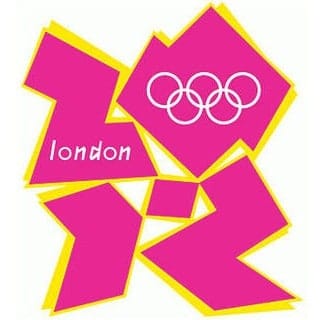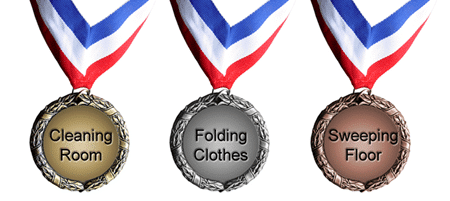There is a lot of excitement in my house with the coming 2012 Olympics in London, mainly because my 10-year-old daughter is a competitive gymnast. We watched the women’s gymnastics trials a few weeks ago, and my daughter has some clear favorites and has been critiquing how each of the gymnasts are doing. But as we sat around watching the trials, I realized that something wasn’t happening…the household chores.
Let me preface this with a statement. We have a very dynamic household given that all 3 of my daughters are very active in a variety of activities, distinct and unique to each one. And because of what they are doing in these activities and the time commitment, we really don’t push them to do chores each and every day. It’s more of a “help out when you can” type of scenario. My oldest, at 13, is on track to be a professional ballet dancer, my middle one, the 10-year-old, does competitive gymnastics and piano, and my 8-year-old, is well on her way to being an actress.
But I digress. This articles is about getting your kids to do their chores. In our house, it’s like moving mountains to get them to do anything…well, that’s a bit extreme…it is often a challenge. They do help out in many ways, often without being asked. But there are other times where a little bit of prodding goes a long way.
So I was thinking, with the Olympic buzz vibrating in the air, there could be a good way to capitalize on this moment and test out and use a new way of paying for chores that are done and get quality results in the process. What lead me to this idea was also the fact that I believe nation-wide, there will be a shifting of competitive gymnastics scoring at the pre-college level to match the same scoring that Olympic athletes are governed by. I set out to try to understand how that scoring works, and how I could apply it to the task of getting chores done around the house.
How Olympic Gymnastics is Now Scored
For starters, gymnasts can no longer achieve a perfect 10.0. That’s a big change. They now get two scores: one for what they do (their routine – the “D score” – difficulty) and the second for how well they do it (their execution – the “E score”).
The “what” depends on their tricks and other parts of their routing. This is essentially the “content” of their routine. Think of it as writing an essay, it’s the substance, the insights and the conclusions. Basically, what the essay is about and the articulated thoughts and arguments. Each element of a routine has difference values, from A to super E, and scoring for this is based on this. And if they combine different elements, they can get higher marks.
The “how well” is all about execution. This one is based on the “perfect 10” score and as the routine progresses, the gymnast receives deductions because of flaws in their execution. In terms of the essay metaphor, think about grammatical, punctuation and spelling mistakes. Each one of those that is encountered receives points off of the grade of your essay.
Then, you combine these scores to get the gymnast’s overall score. If you want to read more about it, head over here.
How to Apply this Olympic Scoring to Chores
The traditional allowance system works for the most part. However, I’m not entirely sure that you are getting the best quality performance and execution by using it. I have found that by saying “you will get you allowance if you do XYZ” the resulting work is the bare minimum. So that is why I thought about tweaking the process to increase the incentive.
Here’s what I’m thinking. You decide on a chore that needs to be done. Every chore has a level of difficulty. Sweeping the floor has a lower “what” score than putting away clean laundry, for example.
Then there is the “how well” the actual task is done. Did they sweep everything well or did they just hit the main areas? Did they carefully put their clothes away or did they just shove the clothes in their drawers, wrinkling them in the process?
So, using the two examples above, here’s how the scoring might play out.
Sweeping the floor would have a lower difficulty (D score) than putting away their clothes. Therefore, the monetary value of these two chores would be different. Let’s arbitrarily say that floor sweeping is $2 and the clothes tasks is $4. You would set these difficulty levels ahead of time (and their prices too).
Then, you have to evaluate how well they executed on their chores, the E score. This is where you set a “perfect score” (a 10) and deduct away from it depending on how well they did the task.
So let’s say that if they were to sweep the floor or put away their clothes perfectly, they would receive an additional $3. If they did it pretty well, they would receive $2, somewhat well would be $1 and really badly would mean that all of the points were deducted and they wouldn’t get anything.
Therefore, a well-swept floor would earn them $2 for their “Difficulty” and $3 for their “Execution” ($5 total) while a mediocre job of putting away their clothes would get them $5 total as well, but with a Difficulty of $4 and an Execution of $1.
Make sense?
Yes, it’s a bit complicated and you might have to set up a rate & rule card ahead of time. And you will probably have to explain it to them a few times. But, there are clear advantages over the traditional method of paying for chores:
- They are encouraged to choose more difficult chores -> higher Difficulty Score
- There is an incentive for them to do a better job at their chores -> higher Execution Score
And if you have 2 or more kids, you might be able to apply the concept of a Team Score to the entire equation. I haven’t quite figured that one out yet as it might be a bit more difficult to balance out the “slackers” of the team with the “performers.”
Regardless, it’s a different and timely approach to doing chores in a fun way. Using the 2012 London Olympics as the background, you could potentially create a great new home Olympic sport of chore-doing. If any of you try this out, I would love to hear about the results so be sure to leave a comment. Also, if you have ideas about how to improve on this scoring methodology, let me know as well.
HTD says: Create your own gold-medal-winning Olympic Team right in your own home, and get those chores done in the process!








1 comment
Brent Pittman
Sounds like you’ve got a busy household. How’s the house looking with the new system?